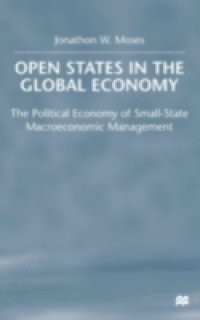OPEN States in the Global Economy offers an outside-in framework for analysing the way in which national economic sovereignty is affected by globalization. In response to the largely closed-economy assumptions of most cross-national work on economic policy-making, this framework interprets small-state behaviour in terms of price- and/or policy-taking: small open states are always adjusting to changing international conditions. In short, economic policy choices are understood in terms of both international and domestic pressures. This new framework is then applied to a detailed case study of Norwegian economic policy-making. The Norwegian case is particularly well suited for the task, as it represents a best-case scenario for those who believe that politics still matters in an increasingly global economic context. In contrast to the assumptions of most cross-national studies, however, Norwegian full employment was not secured with an actively or consistently Keynesian policy mix. Rather, Norwegian policy mixes changed frequently in response to external developments.

